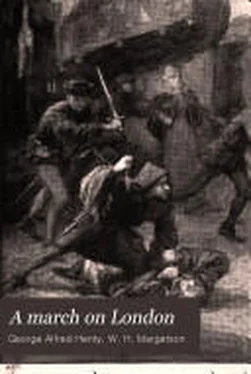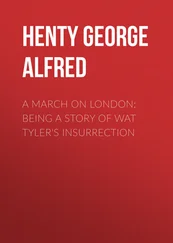“I would do so gladly, Sir Edgar, but I fear that it would be difficult to manage. Both before and behind the house there are evidently men on the watch to see that no one passes out. My own men-at-arms have been stopped and questioned, and were you to issue out methinks that there would, on the instant, be an uproar, for so great a crowd would gather in a few minutes that even had you a strong guard you might be torn from them. You see, though some eight of us knights and three hundred men-at-arms were placed here to aid in the defence, we could do naught without the assistance of the townsmen, who have on all occasions fought stoutly. Were there to be a fray now, the safety of the town would be compromised, for the craftsmen of all these towns are as fickle as the wind. The men of Ypres fought by the side of those at Ghent at one time, and when the Count of Flanders came here, great numbers of the townspeople were executed. At present, why, I know not, they are fighting stoutly for the count, while the men of Ghent are with the besiegers; but were there to be troubles between them and us, they might tomorrow open their gates to the English.”
“That I can quite believe, Sir Robert. I can only say that we are in your hands, and are ready to pursue any course that you may think best, either to stay here quietly and take the risk of what may come of it or endeavour to escape in disguise if so it could be managed.”
“I would that it could be managed, for the matter is causing us grave anxiety. My comrades are, of course, all with me, and hold, that even if it comes to a struggle with the mob, the lives of prisoners who have surrendered on ransom must be defended. I suggested that we should hold counsel here, that two should remain, and that you should sally out with the others, but our faces are all so well known in the town that there would be little chance indeed of your passing undetected.”
“Think you, Sir Robert, that we could pass along the roofs, enter a casement a few houses along, and then make our way out in disguise?”
“It would be well-nigh impossible. The roofs are all so sloping that no one could maintain a footing upon them.”
“When it gets dusk I will, with your permission, Sir Robert, go up to one of the attics and take a look out.”
“By all means do so. Escape in that manner would certainly be the best way out of the dilemma, though I much fear that it cannot be done.”
When it became so dark that while he could take a view round, his figure could not be recognized at a short distance, Edgar, with Albert and Hal, went up to the top of the house, and the former got out of the highest of the dormer windows, and, standing on the sill, looked out. The roof was indeed so steep that it would be impossible to obtain a footing upon it. Its ridge was some twenty feet above the window. The houses were of varying heights, some being as much as thirty feet lower than others. Still it seemed to Edgar that it would not be very difficult to make their way along if they were provided with ropes. Descending, he told Sir Robert the result of their investigations.
“It would,” he said, “be very desirable, if possible, to come down into some house which was either uninhabited, or where the people were friendly. Still that would not be absolutely necessary, as we might hope to make our way down to the door unperceived.”
“There is one house which is empty,” Sir Robert said, “for the owner left the town with his family before the siege began, he having another place of business at Liege, He was an old man, and was therefore permitted to leave; for he could have been no good for the defence, and there would, with his family and servants, have been ten mouths more to feed had he remained. It is the sixth house along, I think, but I will see when I go out. Once in the street and away from here, there would be no difficulty. I would meet you a short distance away, and go with you to the walls, from which you could lower yourself down. One or two of my comrades would give their aid, for, naturally, all would be pleased that you should escape, and so put an end to this cause of feud between us and the townsmen. You would, of course, require some rope; that I can easily procure for you.”
“We shall want several lengths, Sir Robert, and two or three stout grapnels. We shall also want a strong chisel for forcing open a casement.”
“All these you shall have; one of my men shall fetch them to-morrow.”
On the following day the ropes and grapnels were brought in, and Sir Robert, who had been out, ascertained that he had been correct, and that the empty house was indeed the sixth from that he occupied. “I have been speaking with two of my comrades,” he said, “and they will be with me at ten o'clock to-night at the end of the street that faces the house through which you will descend. I shall accompany you to the foot of the walls. The citizens are on guard there at night, and if they ask questions, as they may well do, my comrades will say that you are bearers of a message to the King of France to pray him to hasten to our aid. I shall not myself go up on to the walls, for were I to do so suspicion might fall upon me. Should you be interrupted as you go along the street to meet us, give a call and we will run to your assistance.”
“And now as to our ransom, Sir Robert?” Edgar went on.
“Trouble not yourselves about it,” he replied; “you are but young knights, and 'tis a pleasure to me to have been of service to two such valiant young gentlemen. Moreover, I consider that I have no right to a ransom, since, instead of letting you go free to obtain it, or holding you in honourable captivity until it is sent to you, you are obliged to risk your lives, as you assuredly will do, by climbing along those roofs to obtain your liberty; therefore, we will say nothing about it. It may be that some day you will be able to treat leniently some young Flemish or French knight whom you may make captive. As to your armour, I see not how you can carry it away with you, for you will have to swim the ditches; but the first time that there is a flag of truce exchanged I will send it out to you, or should there be no such opportunity, I will, when the siege is over, forward it by the hands of some merchant trading with England, to any address that you may give me there.”
The two young knights thanked Sir Robert De Beaulieu most cordially for his kindness to them, and at his request gave him their word not to serve again during the campaign. This, indeed, they were by no means sorry to do, for they had keenly felt the slight paid to Sir Hugh Calverley by the haughty bishop in acting altogether contrary to his advice. They also had been thoroughly disgusted by the massacre at Gravelines, and the sack of so many towns against which England had no cause for complaint.
In the afternoon Sir Robert brought three doublets and caps for them to put over their own clothes, so that they could pass as citizens. They employed some time in wrapping strips of cloth round the grapnels, so that these would fall noiselessly onto the tiles.
At nine o'clock Sir Robert said good-bye to them and went out; and half an hour later they ascended to the upper story. They were well provided with ropes, and had made all their arrangements. Edgar was the first to fasten a rope round his body, and while this was held by his companions he was to get out on the window-sill and throw a grapnel over the ridge and pull himself up by the rope attached to it.
The others were to fasten the rope round their bodies at distances of twenty feet apart, so that if one slipped down the others could check him. Edgar took off his shoes and tied them round his neck, and then stood out on the window-sill, and threw the grapnel over the ridge of the roof; then he drew the rope in until he found that the hook caught on the ridge.
Читать дальше












